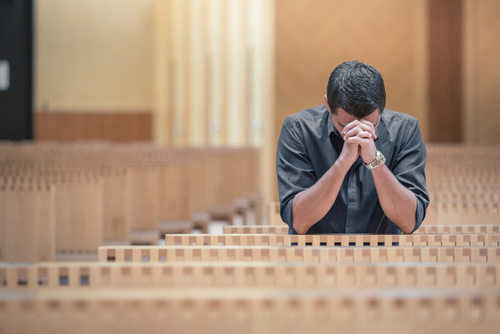Preparing to serve as a liturgical minister
“In order that the liturgy may possess its full effectiveness, it is necessary that the faithful come to it with proper dispositions, that their minds be attuned to their voices, and that they cooperate with divine grace, lest they receive it in vain. …The spiritual life…is not limited solely to participation in the liturgy. Christians are indeed called to pray in union with each other, but they must also enter into their chamber to pray to the Father in secret, further, according to the teaching of the Apostle, they should pray without ceasing” (No. 12 Constitution on the Sacred Liturgy, 1963).
Everything about our Catholic tradition calls us to be people of prayer.
During this time of year, when many parishes are offering renewal and training for those who serve in the liturgical ministries, it is important to take note of these comments above, quoted from the Constitution on the Sacred Liturgy from the Second Vatican Council.
As ministers in the liturgy, the presider included, leaders in liturgical prayer must be people of prayer themselves. We cannot give to others what we do not have within ourselves. In order to give a prayerful spirit, we must have a prayerful spirit.
A prayerful spirit means that we are cooperating with divine grace. It means we pray to our Father in the secret of our personal life, without ceasing. Liturgical ministers are leaders of liturgical prayer, and in order for liturgical prayer to have its full effectiveness, the ministers must come to it with this proper disposition, with lives filled with prayer throughout their days.
There are many ways to pray, through formulaic prayers and devotional rituals, the rosary, meditation, silence — just to name a few.
Silence is a form of prayer that we often ignore, but one especially needed today. Our silence in personal prayer will affect our liturgical prayer. In our daily lives, we are surrounded by information, entertainment and every form of mental stimulation. We become overwhelmed and lose track of the pathway of silent prayer.
Silence connects us with truth. It connects us with God. It changes how we see and feel about the world around us.
“Each of us has an ever-faithful companion-presence. Something that is always with us. Something that helps us to live with inner integrity and depth, to see through the outer coverings of others and of the world to their purpose and core being, and to get over placing ourselves at the center of everything. This companion-presence is Silence” ("Silence, the Mystery of Wholeness," Robert Sardello).
This silence is not just a quietude, but a deep communion, a holy union with the creator, with all persons, and with all of creation. There is a largeness to silent prayer that is beyond all time and place. There is a oneness that sees beyond all differences and divisions.
“If the world is sacred because of the holiness of the Creator, then in a sense there is nothing which is ‘ordinary.’ Everything and every event can move us to recognize Divine Presence… Silence is a privileged way to raise our awareness of the sacredness of the ordinary” ("Silence, Everyday Living and Praying," Joyce Ann Zimmerman).
Recognizing the divine presence in the ordinary — isn’t that what we do at Mass? The presider raises the bread and wine during the consecration, and the gesture itself says: See, here, by walking the way of remembrance in Christ, the ordinary stuff of bread and wine becomes an extraordinary presence of God. By walking the way of remembrance in Christ, we ordinary people become an extraordinary presence: the living body of Christ. The prayer of silence leads us to this deep awareness.
Parish liturgy committees need to regularly remember and renew the corporate silence called for in the Mass and noted in the General Instruction of the Roman Missal (GIRM):
- rn
- before the Mass begins (GIRM 45)
- after the presider calls upon the assembly to take part in the penitential act (GIRM 51)
- following the invitation to pray (“Let us pray”) the Opening Collect, Prayer Over the Gifts, Prayer After Communion (GIRM 54)
- before the Liturgy of the Word begins, after the First and Second Readings and after the homily (GIRM 56 and 66)
- after each intention of the Universal Prayer, before the reader invites “We pray to the Lord” (GIRM 71)
- when the sharing in Communion is finished (GIRM 88)
rn
rn
rn
rn
rn
rn
rn
Liturgical ministers, especially, but every member of the assembly also, need to remember to pray in silence throughout the week and to bring that prayerful silence to the liturgy.
United together, may our liturgical silence be strong enough to transform us in ever deepening ways into the communion of God.
Start your day with Always Forward, our award-winning e-newsletter. Get this smart, handpicked selection of the day’s top news, analysis and opinion, delivered to your inbox. Sign up absolutely free today!

